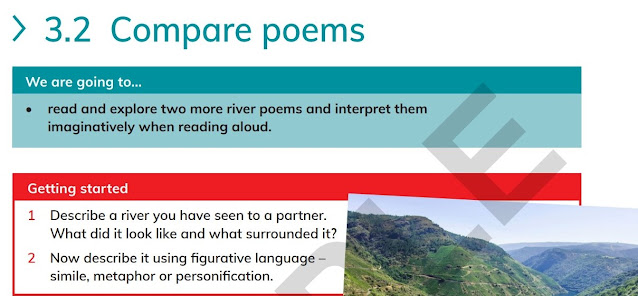Comprehension - 1.8 Review Dialogue (Tuesday; 13/9) (Wednesday; 14/9)
K: Know the correct punctuations for direct speech.
U: Interpret the narrative and dialogue of text.
D: Change direct speech into reported speech.
Words of the Day
1. Register
2. Ellipsis
Let's Begin!
Please refer to pages 30 to 31. Write today's day and date in your Comprehension book.
Take 5 minutes to read and understand the passage.
Task 1
Please refer to page 32 in your learner's book. Set 1a to 1c and 1e. Write only your answers in your Comprehension book.
You have 20 minutes for this task.
Task 2
Please refer to page 33 in your learner's book. Answer Set 2a to 2d in your Comprehension book. For 2d, your word limit is at least 50 words.
You have 30 minutes for this task.
Do you remember these speeches?
Direct speech - Literal dialogue spoken by speaker. Has speech marks.
Reported speech - Reported speech of someone's words. No speech marks. Uses past tense.











Sample Answers
ReplyDeleteSet 1
1a. Dialogue has speech marks and is known as direct speech. Narrative has no speech marks and is known as reported speech.
1b. Ellipsis are for pause. / Ellipsis show that he is trailing off.
1c. Figurative. It shows that he starts to realize what is going on. / Figurative. He realizes the truth.
1e. (List down 5 traits about Neddy and 5 traits about Rose)
Set 2
2a. Speech marks = Start with open speech marks, then dialogue, then a punctuation, then a closing speech mark. New line = New character speaks, new paragraph/line is needed. Punctuation = (pick a punctuation from the extract and write its purpose).
2b. Rose slowly asked Neddy as to why he had kept their secret from her. Neddy shook his head and replied that she would not have understood. At least that was what he thought.
2c. Reported speech usually starts with 'that' before the spoken text. / Reported speech are always past tense. / Reported speech has no speech marks. / Reported speech usually change pronouns.
2d. (Write a 50-word short that continues the extract).